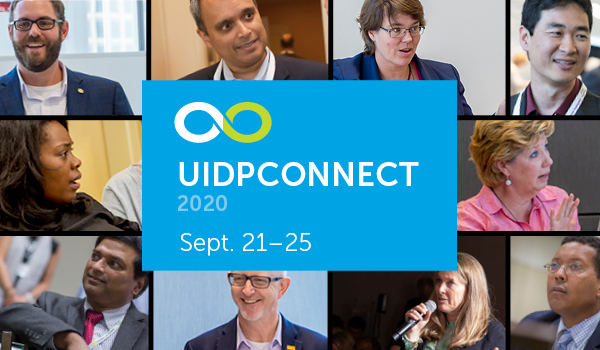Today’s leaders need the foresight to set organizational vision and strategic know-how to achieve critical goals. Enjoy more than five hours of recordings, plus slides and reports that offer further insight to deepen your knowledge.
These timely materials, originally recorded Sept. 21-25, 2020 during UIDPConnect 2020, are curated for research leaders to support your work. Click on the session titles for timely insight from speakers representing McKinsey & Company, Innosight, Penn State, UNC Chapel Hill, and more.

Prioritizing innovation today is the key to unlocking postcrisis growth. The COVID-19 pandemic has upended nearly every aspect of life, from the personal (how people live and work) to the professional (how companies interact with their customers, how customers choose and purchase products and services, how supply chains deliver them). McKinsey & Company has worked with thousands of organizations across industries and found that the majority of executives expect the fallout from COVID-19 to fundamentally change the way they do business over the next five years, and yet very few feel prepared to capture the new opportunities that are emerging. How should companies that believe in the innovation imperative pivot to pursue it today? Watch this discussion on how innovators can navigate the crisis and emerge stronger in the next normal.
Laura Furstenthal – Senior Partner, McKinsey & Company
Erik Roth – Senior Partner, McKinsey & Company
Associated resource: Corporate RFP Quick Guide
Learn how innovations from the steam engine to the search engine come about: generally in a less heroic, less planned, and less individual way than we imagine. Innovation is a gradual, emergent, collaborative, serendipitous process involving lots of trial and error. This has implications for how innovation policy should be done.
Kevin Byrne – President and Chief Executive Officer, The University Financing Foundation (TUFF)
Matt Ridley – Author of How Innovation Works: And Why It Flourishes in Freedom
James Delattre – AVP for Research and Director, Office of Entrepreneurship & Commercialization, Penn State University
Evan Facher – Vice Chancellor for Innovation and Entrepreneurship, University of Pittsburgh
Michael Matthews – Director of Partnerships, EMD Performance Materials
Karen Temple – Commercialization Manager, University of Toronto
Senior OECD economists share data and trend analysis illustrating how countries invest and accelerate R&D investment.
Sandra Planes Satorra – Innovation Policy Analyst, OECD
Fernando Galindo Rueda – Senior Economist, OECD
Jennifer Hebets – Business Development and External Innovation Manager, Mars Incorporated
The hockey player Wayne Gretsky famously said, “I skate to where the puck is going to be, not to where it has been.” Similarly, strategic planning involves a process of determining where an organization wants to go, rather than an analysis of where it has been. Key to this strategic analysis is the development of the plan, or roadmap, of needed steps to effect such change. Strategic Roadmapping is a technique for linking strategic vision with the development of needed organizational capabilities that enable achieving short and longer-term strategic goals. This is usually done as an internal exercise but for many companies viewing capability needs outside their organization, including academic partners, can make the roadmaps more robust. Universities can similarly deploy the tools of roadmapping to determine future direction and ‘preferred partners’. UIDP held two workshops on Strategic Roadmapping in 2019, one at UIDP 28 at NC State University and one at the Oxford UIDP Summit. These workshops validated the utility of roadmapping as a tool for deeper university-industry strategic partnerships as well as the high interest among UIDP members on the topic. This overview discusses work to date on this topic and potential areas for further study with the goal of developing a UIDP Quick Guide on Strategic Roadmapping.
Stewart Witzeman – UIDP
Ned Calder – Partner, Innosight
Freddy Solis – Manager, Innosight
Alan Blatter – Senior Manager, Edgewell Personal Care
The COVID-19 pandemic caught the world unprepared. Can an open science approach to research collaboration thwart the next one? Learn how through a discussion of how the Eshelman Institute for Innovation from the University of North Carolina’s top-ranked pharma college envisioned READDI, a public-private partnership to discover and develop five novel anti-viral drugs in five years so we’re ready the next time around. This session examined how it happened, what still needs to be done, and what lessons can be taken from this approach to accelerate private/public innovation.
John Bamforth – Director, Eshelman Institute for Innovation, University of North Carolina, Chapel Hill
Kumar Saikatendu – Director, Global Research Externalization, Takeda
Julia Ronlov – Business Development, Corporate Strategy, Oregon Health & Science University


